Peter MALONE
Saturday, 18 September 2021 19:54
Opposite Sex, The
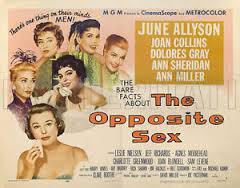
THE OPPOSITE SEX
US, 1956, 117 minutes, Colour.
June Allyson, Joan Collins, Dolores Gray, Ann Sheridan, Ann Miller, Leslie Nielsen, Jeff Richards, Agnes Morehead, Charlotte Greenwood, Joan Blondell, Sam Levene, Alice Pearce.
Directed by David Miller.
The Opposite Sex is a remake of the 1939 classic, The Women, George Cukor’s film of Claire Booth Luce’s play with dialogue by Anita Loos. The classic can stand by itself, even in the light of the 2008 remake.
1956 was the era of Cinemascope and colour, big screen treatment in remakes of classic films. And this was MGM, so music is added and a lot of songs, especially sung by June Allyson whose husky voice is an acquired taste, even though she was a petite actress of great energy and verve. There is a rather camp song with chorus girls including Joan Collins. And there is comedy turn with Dick Shawn and Jim Bacchus as a psychologist – very dated now.
One of the main features of The Women was that there was talk about me but no man appeared. This is not the case here, with quite a number of men including Kay’s husband, Stephen, played by Leslie Nielsen, something of a surprise to see him as a romantic hero after all his later comedies. There are husbands, agents, and Buck, Jeff Richards, a gigolo type from a hostel for divorcees in Reno who also has his musical number.
June Allyson was popular at the time and so acceptable in the central role. It is singer Dolores Gray, who made only a few films including Kismet and Designing Woman, who has the acid role of the gossip friend. She is usually accompanied by Joan Blondell, continually pregnant. Ann Sheridan is a playwright who is the confidante of Kay. Agnes Morehead turns up as the Countess with Ann Miller, not dancing, as another divorcee. Charlotte Greenwood is the proprietor of the hostel for the divorcees in Reno. The villain (Joan Crawford in the original) is a very young Joan Collins who was making her mark in Hollywood.
The main enjoyment comes from looking at the stars and listening to some of the waspish dialogue from the original. The film was directed by David Miller, who made brief films in the 1930s, moved to MGM and bigger budgets with Billy The Kid and was to direct such popular films as Sudden Fear with Joan Crawford.
1. A colourful film of the 50s? A remake of the classic 1930s films, The Women?
2. The use of the original film, the characters, situations, dialogue? Adapting it to the widescreen and colour of the 1950s? No men in the original, men in this version?
3. The addition of music, the songs, June Allyson and her singing, part of the plot to go back to the show, her recordings? The camp song and dance, the dancer and singer, the girls, the choreography? Harry James and his band? Dick Shawn and his comic song, Jim Bacchus as the psychiatrist? At the time? Now?
4. New York City, glossy treatment, the world of the wealthy, fashions, shops and beauty care, the theatre? Reno for the divorcees?
5. The themes of marriage, affairs, separation, divorce, the effect on the children?
6. June Allyson as Kay, her love for Stephen, Leslie Nielsen as Stephen (before his comic roles), happy marriage, the anniversary coming up, the party and the tension, the gossip, Kay hearing it from the beautician, upset, going away after the party? Amanda as her confidante and adviser? Sylvia and her interventions, gossip? Looking for Crystal, finding her, the encounter?
7. Sylvia, her gossip, her own marriage? The contrast with Edith and the other women? Edith and her continued pregnancies, her husband? Listening to the gossip?
8. Kay going away with Amanda, helping to understand the situation better? The scenes with her daughter, the daughter staying with Stephen? The decision to go to Reno, meeting Lucy, the other divorcees, Countess, Gloria – and her being the other woman with Sylvia’s husband? Buck, handsome but somewhat dumb, his escort role, the touch of the gigolo? Sylvia becoming involved with him? Kay resisting him?
9. The return to New York, Sylvia with Buck, Buck and his performance, the fans, Crystal setting her eye on him, his going along with her?
10. The character of Crystal, the work in the theatre, catty, discussions with her fellow-dancer, Pat? Setting her eye on Stephen, producer of the show, the phone calls, the dinner, his sending flowers? The encounters with Kay and the other women? Encounters with the daughter, the scene in the bath, the hostility?
11. The finale, at the restaurant, Kay deciding to go, her plan, the help of the columnist, Mike Pearl and his help, yet her love for Stephen? Exposing Crystal
and her relationship with Buck, humiliating Sylvia? Winning back Stephen?
12. The humour from the original film diluted for an MGM 50s musical?
Published in Movie Reviews
Published in
Movie Reviews
Tagged under
Saturday, 18 September 2021 19:54
Draft Day
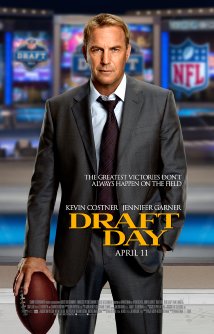
DRAFT DAY
US, 2014, 110 minutes, Colour.
Kevin Costner, Jennifer Garner, Denis Leary, Ellen Burstyn, Chadwick Boseman, Frank Langella, Terry Crews, Sean Combs, Tom Welling, Rosanna Arquette, Sam Elliott, Jim Brown, Kevin Dunn.
Directed by Ivan Reitman.
Draft Day is a particularly American film, a film about the football league, the buildup to the day of the draft, and the draft procedure itself, in the presence of thousands of fans. Those who follow American football will find the film of great interest, those who do not follow it might be puzzled by many of the aspects, but intrigued by the politics and machinations that go on that one behind the scenes.
There is great detail about the nature of the draft, highlighting of many American cities and indication of the teams. The film opens with negotiations between Seattle and Cleveland, with Kevin Costner playing the manager, taking over from his father, the very long-time coach who died the week previously. Many of the local fans are not enthusiastic about the new manager. He also has trouble from his coach, played by Denis Leary, who does not approve of him and his tactics and becomes involved with other teams, phoning throughout the day. The accountant for the club is played by Jennifer Garner who is in a relationship with the manager, though it is secret and she is pregnant. She has a great knowledge of football and brings this to bear in her advice. There is also a research team, investigating the backgrounds of the potential nominees for the team.
There is a lot of emotional pressure as well is a need for clear thinking, testing out the player that the team wants, especially the owner, played by Frank Langella, who wants the manager to make a public splash and get fans’ attention. As the day goes on, there is the complication of the spreading of his father’s ashes, and pressure from his mother, Ellen Burstyn, and his ex-wife, Rosanna Arquette.
As the draft begins, there are even more strategy plans, phone deals, reversing previous decisions – and, ultimately, to the advantage of the Cleveland manager.
The film was directed by Ivan Reitman, best known for his comedies like stripes, Ghostbusters, Dave.
1. The title? American football? The sports film? Deals and politicking?
2. The time span, one day, the clock counting down, issues of the draft, the carrying out of the draft?
3. The importance of time, the moves, deals, preferences on the draw, the anticipation of the players? Time to think, consult? The coaches and the team, managers, the implications of investigating the players and their suitability, weaknesses?
4. American, the indication of the cities, the names of the teams, the visuals?
5. The focus on Sonny, Kevin Costner’s presence, as a character in himself, his relationship with his father, the coach, sacking him, his death? His relationship with his mother, her criticism of his manoeuvres, the ashes, scattering them, wanting him to read out his father’s words, his unwillingness, the group going onto the ground? Ali, his relationship, secret, the pregnancy, at work, the note in his pocket and her finding it with Vontaë’s name as the original choice?
6. The first deal, the group from Seattle, wanting Bo, the choices, and issues of popularity in Seattle, fans and hostility? The deal with the team, Sonny agreeing? His situation and Cleveland, fans and their protests, comparisons with his father, hunting Bo, the role of Drew and his past season, change? Vontae and his fans and manager? Sonny, his discussions with him?
7. Ali, at work, the new young secretary and his interventions, serious, Sonny ruining his computer? The coach, his hostility, the choices, the work of the research team? Negative advice about Bo?
8. Complexities, Bo and his manager, Vontae and his being upset?
9. The details of the further deals, the timing? After the draft had started? The details, timing, draft options? Sonny’s choice?
10. Ali at work, the knowledge of the game, statistics and information, the secret relationship with Sonny, her pregnancy, not wanting the relationship a secret any longer? Sonny going to the room with her, consulting? The coach wanting Ali’s help? Her refusal? Sonny’s mother, the ex-wife, the mother and her getting her name wrong, later getting it correct?
11. The coach, his skill as a coach, his hostility as a personality, phone calls to rival teams? Sonny firing him or not? His watching, at the end, agreeing?
12. The owner of the team, the water slides, his wanting a splash, his being happy with Bo being drafted, preparing the jersey, going to the draft, his reaction
to Sonny’s choice, the flight, his anger and confrontation, having to wait, his final agreement?
13. Drew, his wife and family, his anger, his training during the break, the issue of returning the money at the back of the book, offered to all the players, to check whether they had read the book? Bo and the money? The advice about the video with Bo and Vontae giving the ball to his sick sister, Bo and his being able to be unnerved?
14. Sonny needing time, alone, anger, his mother, the ashes?
15. The final bargaining, getting back his options in the draft in the coming years, selecting Vontae, the phone calls, Vontae’s surprise and happiness?
16. Success, Vontae and his arrival, drew being reassured, Bo and his manager, the tension in waiting, other teams wary of Bo, finally selected?
17. Success, the photo, the opening of the season?
18. Insights into American football, into the politicking, into the deals, the toll on the managers?
Published in Movie Reviews
Published in
Movie Reviews
Tagged under
Saturday, 18 September 2021 19:54
Glory Road
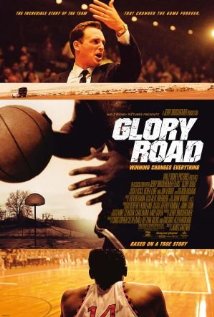
GLORY ROAD
US, 2006, 118 minutes, Colour.
Josh Lucas, Derek Luke, Austin Nichols Jon Voight, Emily Deschanel.
Directed by James Gartner.
While Glory Road is a Disney film, it was produced by action director Jerry Bruckheimer, producer of such films as Top Gun.
This is the story of Don Haskins, played with energy by Josh Lucas, who was coaching girls, specialty basketball. He was approached by a scout from El Paso’s West Texas College. He agrees and pressurises for a better budget for scouting new players, deciding that the best players were black and goes to interview them, offering scholarships, training them – not without difficulties of discipline and experience of hostility and racism leading to victory in the College Competition of 1965-1966.
There is some criticism of the film that it is not quite accurate, Haskins going to the college several years before his work with the special team. There is further criticism that the play portrayed in the film was not always accurate, more for edge and drama. For basketball fans and those who know the sport, there is enough to keep the attention, and relate to the play.
The setting is that of the Civil Rights era, the era of Martin Luther King and nonviolent response to racism. The young men are tested, insults, immersion in toilets, graffiti in rooms, trashing of rooms. Urged to control the anger and left it out in the competitive games, retaining the dignity.
The film is particularly American – but basketball fans in the audience will probably not mind too much.
1. Disney film? The career of producer, Jerry Bruckheimer and action films? A vigorous film?
2. The title, basketball, college competition 1965-1966, championship? West Texas Miners?
3. Audiences and familiarity with basketball, the play, competitiveness? In the American context? College basketball? The team, tough, training and practice, tactics, skills and talents? The visualising of games being played? The fans, the cheerleaders? The role of the media?
4. Don Haskins, story? Criticism of the accuracy of the information? As husband and father, domestic scenes, coaching the girls, discovered by scouts watching, the interview, his agreement, the conditions, living on campus? El Paso, West Texas, the time, the college, small? The authorities at the college? Racism? Discovering new talent and the small budget? The young assistant, scouting in New York, set upon by the men? The old coach?
5. Travel, interviewing the black players, in Gary, Indiana, the Bronx? The variety of conditions? Play, school, jobs? Family backgrounds? Prepared to play, the men’s puzzles, the background of racism? Acceptance, the scholarships? White players? Authorities, Texas sponsors of the team and the reaction?
6. Accommodation for the students, studies and scholarships, classes?
7. Don, his wife and children, the system? His wife’s support but finding the racism difficult?
8. The old coach and his support, travelling, his wise words, the father-figure?
9. The details of practice, the men and their drinking, girlfriends? Don and his disapproval of their attitudes and lack of discipline?
10. White players, seeing themselves as a minority, the black players challenging and saying that this was their experience?
11. Don and his control? His interaction with the men? The players and Don’s rules, asking to play their own, with skills, fast play? Winning?
12. The visualising of the games, competitiveness and progress, scores and penalties, the final victory? Winning the championship?
13. The racist treatment, the player with his head in the toilet? Smearing and trashing the rooms? Racist talk? The media and the questions? The men’s reactions, advised to channel angers?
14. The mothers, demands on their sons, the player with the condition, Don not risking his place, his supporting the other members of the team and his mother urging donned to let him play in the final game?
15. The Kentucky team, the arrogance of the coach, his manner, manners, the press conference and his jibes? The pressure?
16. Don, his wife the social, the racist conversation of the women, the Kentucky coach’s wife and her support?
17. The final, atmosphere, Kentucky coach’s attitude, presumption, the surprise win, the effect of defeat? The media and the question about black ability to sustain pressures?
18. This game as a breakthrough, historical, the Civil Rights?
19. The final information, Don Haskins and all of the players? The Hall of Fame? The Kentucky coach and his implying a black man as coach?
20. The final images the actual places, interviews, the perspective on the experience?
Published in Movie Reviews
Published in
Movie Reviews
Tagged under
Saturday, 18 September 2021 19:54
Sex is Comedy
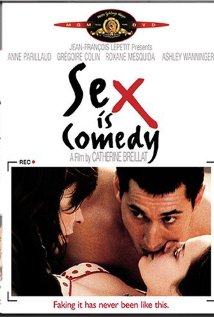
SEX IS COMEDY
France, 2002, 92 minutes, Colour.
Anne Parillaud, Gregoire Colin, Roxanne Mesquida, Ashley Wanninger.
Directed by Catherine Breillat.
In 1976, novelist, Catherine Breillat made a film, A Real Young Girl, based on her book, a look at a teenager coming back from boarding school, bored at home on the farm, with an eye on a young worker at the sawmill, but mainly preoccupied about herself, her sexuality, her body, experimenting with various implements about her sexual response.
In succeeding years, especially in the 1990s, the director made a number of provocative films, seemingly preoccupied with sex and sexual experience, forthright in the dialogue, explicit in filming some of the sexual activity, films like Romance.
With the turn-of-the-century, she began to make several films which were more mainstream, at least more accessible, still preoccupied with female sexual experience, like A Ma Soeur and, later, And Old Mistress. Her experiences in making A Ma Sour, especially in the sex scenes between a young girl and a local young man, were, apparently, very difficult, a lack of chemistry and rapport between the two young actors, some exasperation for the director and the crew. A Ma Soeur is a very interesting film, despite the difficulties in the production.
The young actress in the film is the same actress in Sex is Comedy.
With this in mind, the director then wrote a screenplay based on her experience, the serious aspects, the comic aspects, and the difficulties in filming sex scenes. The result is Sex is Comedy.
The film has two settings, one is on a beach with an attempt to film on the sand, with the background of the sea, the tide coming in. There is a lot of explanation, demonstration of how to do the scene, a reluctance on the part of the actress, her dislike of the leading man, his seeing it all as a job and not particularly interested in the girl herself, looking down on her. The director has to do a lot of ego-massaging, playing to the two, trying to persuade them to do the scene, especially a kiss. In the meantime, the assistant director, who may or may not be involved with the director, is concerned about the production, especially the changing in the light, the delays in filming – and then a sudden downpour.
The second scene is in the studio, a house a specially constructed with removable walls. The director is having the same problems with the cast, trying to get support from the Assistant Director who feels at times ambiguous about his relationship with her. Once again, she spends a long time with the actor, discussing his motivation, his abilities, his saying that he was being paid for the job, and her appealing to his skills as an actor. She is much more gentle and sympathetic with the young girl, once again explaining the situation, and trying to persuade her to perform, despite her dislike of the actor.
There is a great deal of detail in the action behind the scenes, about the making of the film, the cast standing by, the director of photography and his taking time to get things right, the removal of a wall for a better shot. Because the film is about sex, there is a decision to make a phallus for the actor, with a whole range of them and, eventually, some scenes with his wearing the artificial piece. In the meantime, the director spends quite a lot of time with the actors, trying to rehearse, explaining to them the positions that they will have to take and the movements. She is also concerned about a screenplay, thinking that what she wrote the night before was good but having to adapt it because she now thought it wasn’t good.
Eventually, after a lot of standing round, there is an attempt to make the scene.
During the final credits, there is a glimpse of the director, happy now that the shot is over, with the crew and the cast – a light touch to try to emphasise that sex is comedy.
Published in Movie Reviews
Published in
Movie Reviews
Tagged under
Saturday, 18 September 2021 19:54
Love is Now
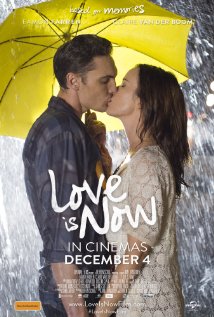
LOVE IS NOW
Australia, 2014, 96 minutes, Colour.
Eamon Farren, Clare van der Boom, Anna Torv, Dustin Clare, Chris Haywood, Heather Mitchell.
Directed by Jim Lounsberry.
Love is Now is a small-budget Australian film, filmed digitally with Nikon cameras which are featured during the film itself.
It is also a romance drama and a road movie.
Eamon Farren is Dean, a photographer, exhibiting his photos, who encounters Audrey, Clare van der Boom, and they decided to go travelling together, by bicycle, to pick fruit during the season. The countryside is beautifully photographed. Dean keeps a photographic chronicle of their journey and Audrey writes a journal.
There are many lyrical scenes, but also the beginnings of differences, squabbles, especially during the fruit picking with the range of characters doing the work, the shared accommodation, nights at the pubs, and Dean wary of Audrey spending a lot of time with James who she says it does not attract her.
The audience has to be alert as to the different times, the film framed by flashback, Dean and his journey, re-living it, remembering it, and his love for Audrey and his regrets.
1. An Australian romantic story? Universal? An American writer and perspective?
2. The city of Sydney, the city itself, the eastern suburbs, photography, galleries, flats? The musical score?
3. The countryside, the roads, the paddocks, the fruit, accommodation, the country town, the pubs, the mountains? Atmosphere?
4. The director, Digital, cameras – and the product placement?
5. The beauty of photography, in the city, in the country? Chronicling the journey?
6. Issues of time, memory, flashbacks, imagination, the past and present, the effect of experiences, reminiscence, re-living the journey, the love?
7. Dean, his life, background, Audrey, the gallery, life in the city, the travel, bikes, the adventures on the road, the fruit picking, the work, accommodation, the pub?
8. Audrey, her background, the attraction, in the city, the decision to travel, the bonding, keeping the journal? The photography?
9. The work, James, the men, the pub, the other fruit pickers, the interactions, characters? The squabbles? Dean and Audrey parting?
10. Ben, his role in the film, the work and the fruit, accommodation, discussions with Dean, memories of Audrey, the photo?
11. The nature of the journey, the repetition of the journey, the years between, life and death, love and memories?
Published in Movie Reviews
Published in
Movie Reviews
Tagged under
Saturday, 18 September 2021 19:54
Harold and Kumar Escape from Guantanomo
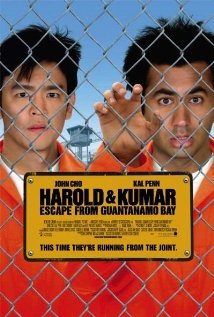
HAROLD AND KUMAR ESCAPE FROM GUANTANOMO
US, 2008, 102 minutes, Colour.
John Cho, Kal Penn, Rob Corrdry, Neil Patrick Harris, Roger Bart, Missi Pyle.
Directed by John Hurwitz and Hayden Schlossberg.
Well, this one is only for devotees of this kind of broad, and frequently pothead, American comedy, plenty of crass jokes, especially bodily functions in the first few minutes so that audiences will know whether they want to stay or not. Devotees who enjoyed the first Harold and Kumar outing will obviously want to see the film, no matter what.
Should one persevere, the result is a sometimes very funny (sometimes not but the makers don’t worry as they hurry on to the next episode and know that humour is hit and miss) spoof of bigoted American attitudes as well as the fear of terrorists. Harold is a Korean American, Kumar Indian. The number of jokes that would be considered in execrable bad taste in an ‘ordinary’ film are so blatant that they are funny. A scene where the US intelligence agencies interview the parents of both Harold and Kumar, employing a translator who speaks laborious Korean and cannot understand their English makes the point. Kumar is also prone to draw on his complexion as an occasion for attacks on presumptions that he is from the middle east and a terrorist.
Harold is intelligent and tries to do the right thing (though he is almost as much as stoner as Kumar). In flashbacks we see that Kumar had his good moments but how he got to the obtuse personality we see in the film defies credibility. Off they go to Amsterdam but, through Kumar’s gadgets for smoking on board and paranoid passengers seeing terrorists everywhere, they are sentenced to Guantanomo Bay. They don’t stay long, able to escape by sheer chance, get back to Florida and begin a trek cross country to be at Kumar’s former girlfriend’s wedding.
In fact, given the range of people they meet, including some Alabama backwoods types and Neal Patrick Harris who takes them to a western brothel, this is a variation on Borat’s trip across American, plenty of spoof targets.
Rob Gorddry (in some of the Judd Apatow films and What Happens in Vegas) plays to the hilt the most narrow, bigoted, indiscreet and lamebrained intelligence office that ever lived.
One of the final targets is George Bush himself who is shown to be just another Kumar at heart!
Published in Movie Reviews
Published in
Movie Reviews
Tagged under
Saturday, 18 September 2021 19:54
Kamikaze Girls
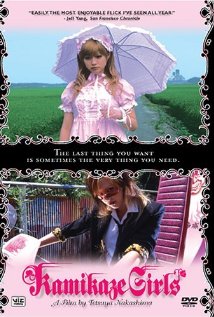
KAMIKAZE GIRLS
Japan, 2004, 102 minutes, Colour.
Directed by Tetsuya Nakashima.
Kamikaze Girls and Memories of Matsuko are getting western release so that it is possible to see Nakashima as an idiosyncratic director with a personal style. It is surreal, to say the least. His stories are a blend of the real and the surreal and he favours bright colours, imagination and dreams.
This is the story of a young girl who tells us that she would prefer to have lived in 18th century Versailles and enjoyed the rococo style, especially of clothes. This is, in fact, how she lives and dresses, sewing patterns with expertise and in demand for her work, though lacking in self-confidence. She encounters a young bikie woman and they become friends, even saving her from a beating (where she turns into a character from Japanese manga traditions).
With the focus on the sweetness and light optimism of the central character, the film is reminiscent of the spirit of Legally Blonde. But then there are the gangs to balance the sweetness.
Published in Movie Reviews
Published in
Movie Reviews
Tagged under
Saturday, 18 September 2021 19:54
Sarkar Raj
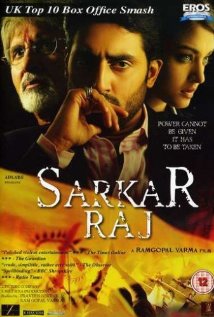
SARKAR RAJ
India, 2008, 125 minutes, Colour.
Amitabh Bachchan, Abishek Bachchan, Aishwariya Rai Bachchan.
Directed by Ramgopal Varma
An Indian film where there is no dancing as such and, while there are some songs, they are part of the background and atmosphere of the film and do not put a halt to the action.
Sarkar Raj is a political film, a sequel to the successful 2005 film, Sarkar, which drew its inspiration from the Godfather films. The director’s statement for this film insists that the sequel does not relate to The Godfather 2. The concern here is with global companies, corruption and politics. It is more Western-audience friendly than many other Bollywood films.
Ramgopal Varma employs a particular visual style that relies on close-ups of faces and unexpected framing of faces, the camera tracking slightly introducing light and shadows that can be suggestive, especially of sinister dealings. The continuously changing angles make for differing perspectives, overhead, ground level, tilting. We are drawn into the characters, listening intently while trying to read their faces and their minds.
Popular Indian star for many decades, Amitabh Bachchan plays the 60 year old Sarkar, a man of status, power and dominance. A statesman, his critics describe him as a gangster in the guise of a leader. Bachchan’s son, Abishek Bachchan, plays his powerful son, Shankar. A corporation in London wants to build a power plant in a rural areal and seeks the support of Sarkar and his son. What follows is a complicated tale of business intrigue, changing loyalties, manipulation of supporters, especially the outspoken son of a local dignitary who operates as a power behind many thrones while being the venerated leader.
Glamour is introduced into the film by the casting of former Miss India and popular star, Aishwarya Rai (who, in real life, married Abishek Bachman in 2007). She plays the influential daughter of the London head of the corporation.
Supporting characters include government ministers, security staff and rival business interests and gangsters.
While some of the performances move over the top for less demonstrative audiences, the key roles are performed with quiet intensity to make this an intriguing film of intrigue.
Published in Movie Reviews
Published in
Movie Reviews
Tagged under
Saturday, 18 September 2021 19:54
Tovarisch, I am not Dead
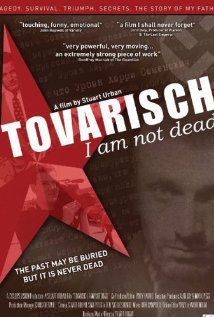
TOVARISCH, I AM NOT DEAD
UK, 2007, 85 minutes, Colour.
Directed by Stuart Urban
Tovarisch, I Am Not Dead was the title of a 1980 autobiography by Garri Urban, the father of the film director. There were many highly dramatic episodes in the book: growing up in Poland, an escape to Romania which was thwarted by capture and internment, time in the Ukraine and then travel after the war to England. The title comes from an escape incident where Garri plays dead to survive and when approached by a Russian soldier, tells him, ‘Tovarisch, I Am Not Dead’.
With home movies, Stuart Urban shows how his father was a larger than life figure, strong, opinionated, loud but also secretive. Urban makes his growing up and the film selection an interesting childhood memoir.
However, with the fall of the Soviet empire, Garri Urban was able to visit Russia and other eastern European countries. His son accompanied him with his camera. Quite a journey it is – although they discover various people, including an old woman who was in love with Garri in the 1940s, and his brother comes to visit from Israel, Stuart is told by Russian officials that there are some stories about the past which cannot be released and would make his hair stand on end. Sorry to say, curiosity about these episodes is not satisfied. Was he a spy? Did he do deals…?
What the film does is offer a portrait of Garri – and we can respond in many ways as he is dominating, attractive, gung-ho, careful, a showman.
We share Stuart’s surprise at what he does discover, about the experience of the war, of the Russian gulags, of people in the Ukraine whom his father visits and who welcome him after forty years.
This is a very interesting ‘first person documentary’.
Published in Movie Reviews
Published in
Movie Reviews
Tagged under
Saturday, 18 September 2021 19:54
Criminal Lawyer
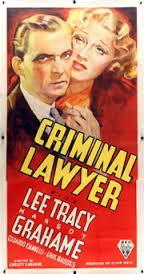
CRIMINAL LAWYER
US, 1937, 72 minutes, Black and white.
Lee Tracy, Margot Graham, Eduardo Ciannelli.
Directed by Christy Cabanne.
Criminal Lawyer is a short vehicle of 1937 for Lee Tracy, a smart-talking star of the 1930s who did not have the expected career. Here he plays a lawyer, too smart for his own good, under the influence of the gangster played by Eduardo Ciannelli. After a police raid, he is able to manoeuvre a fine for the gangster to get out of trouble but, at the night court, he encounters a young woman who has been attacked in the street and saves her from her accusers. He arranges for accommodation in his hotel, employs her as a secretary, but is caught when she witnesses a murder perpetrated by the gangster and fears for the lawyer’s life and career, perjuring herself. To save her, he confesses to being a criminal, having to step down from the DA position he had agreed to.
1. A film of the 1930s? Crime in the US? Justice?
2. The title, the two meanings: Barry as a lawyer for criminals, Barry as a criminal?
3. Black-and-white photography, New York City, apartments, the courts, clubs, gambling? The streets?
4. The credibility of the plot, the law, criminals, fixed cases and juries, the courts?
5. Barry, Lee Tracy and his style, in action, in the court, the initials in hat, not being there? Employed by Larkin? The police raid, organising Larkin to pay a fine? Larkin’s hold, the stacking of juries? Madge, the attack, his stopping to help? A possible DA, Larkin wanting him to accept, the interview, his acceptance?
6. Betty, the outings? Putting her off? The attraction to Madge, helping her? Organising the apartment? Her working as his secretary?
7. The shootings in the street, Larkin, Madge and her evidence? Larkin’s laughter in the court, Barry changing his mind? Madge and her lies, to protect Barry, confessing?
8. The picture of the courts, the judges, the female judge in the night court, defending the prostitutes? The upright judge presiding at the trial?
9. Barry, his confession of guilt, for Madge? His future?
Published in Movie Reviews
Published in
Movie Reviews
Tagged under